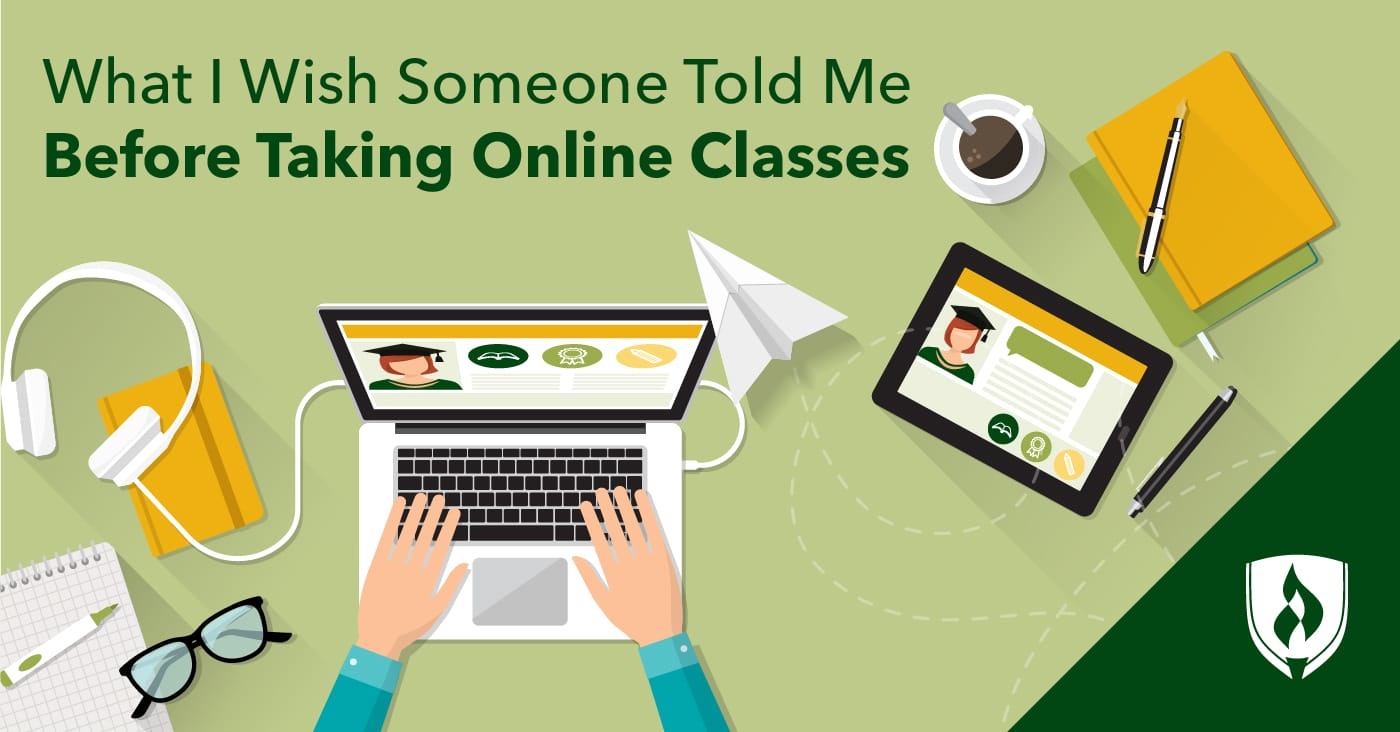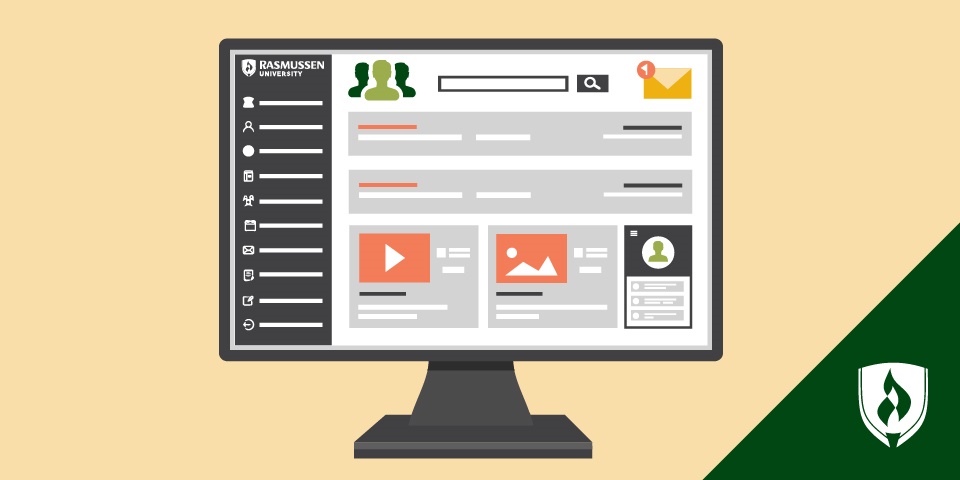
The perks of taking online classes are numerous. They offer additional flexibility for busy students, especially for those balancing school with work and family. They can attract professionals looking for career advancement, parents seeking to better provide for their families and returning students looking to pick up where they left off. Some online programs even provide additional control over the pace of learning.
But if you’ve never taken one before, you might not know exactly how they differ from on-campus courses. Are they harder? What’s the best way to stay on track?
Learn from those who have been in your shoes. Keep reading to get some insider knowledge about what to expect when taking classes online.
7 Things you should know before taking online classes
You're not the first to have questions about taking classes online, and you certainly won't be the last. But there are some insightful lessons you can learn from those who have succeeded in online classes. Here are seven things they wish they had known before embarking on their online learning journey.
1. Online classes are not the 'easy' route
One of the most common questions asked on this topic is, "Are online classes easier?" Put simply, the answer is no.
Opting for online courses over traditional courses is not the easy route for your education. It’s true that online courses offer more flexibility, but that doesn’t change the amount of work you put in.
The flexibility of online classes can be extremely helpful to busy students, but that same freedom also creates additional pressures on those enrolled. It’s up to you to avoid distractions and keep yourself on track.
“Online learning is what you make of it,” says Brian Galvin, chief academic officer for Varsity Tutors. “It all depends on the teacher, the format, and the student.”
Though he admits some online courses may have gained the reputation of being easy due to poor design, many online courses have adapted to requiring more synthesis and analysis from students—the kind of work that isn’t answered with a quick trip to Google.
2. You may actually do better in online classes
While it’s not guaranteed, there is certainly the potential for online classes to provide a lift. If you’re organized enough to keep track of deadlines for upcoming assignments, readings and projects and don’t easily procrastinate, you might enjoy the amount of control you have over how to get it all done.
Online lectures are a great option if you tend to feel lost in the crowd of a classroom. They give you the ability to pause and take thorough notes or even re-watch parts you didn’t quite understand the first time. Plus, you can always reach out to your course instructor through a message to ask questions about material you didn’t understand.
3. You’re going to need technology and IT support to be successful
Your online courses will most likely be accessed through a personal computer or tablet. Our online course veterans recommend taking some time to become acquainted with the platform and utilize any orientation materials prior to class. Having a reliable internet connection and operating system is also crucial to staying on top of your work. You’ll also want to make sure that your school has the resources to support distance learners.
“During the duration of your course, you might experience challenges such as a pdf not downloading, voice issues with the lecture, or the need for extra tutoring, especially if a subject proves too hard,” says Reuben Yonatan, CEO of GetVoIP. “Unless the program offers a seamless online student support program, some of these issues might overwhelm you and affect your studies.”
4. You can make or break it with time management
It’s your responsibility to take the initiative to keep up with your work when enrolled in online classes. It can be easy to let assignments slide and miss due dates because of the wiggle room and flexibility that come with online courses.
Procrastination is a slippery slope and can affect your grade negatively. It’s important to stay organized and follow a schedule because it’s difficult to catch up once you fall behind.
Many students underestimate the amount of time they’ll spend studying for class. You should expect online courses to take about the same amount of time as traditional courses.
“I wish there were resources to help you schedule your time while taking an online class. I didn't know that there would still be strict deadlines in many of the courses, so although you're not meeting during class time, a lot of scheduling and planning still has to be done for the course,” says Gianna Sollitt of Newberry Public Relations & Marketing.
5. Don’t think you’re exempt from group projects
Just because your course is online doesn’t mean that you’ll be exempt from group projects. This staple of the traditional classroom is becoming simpler for distance learners to tackle too. With collaborative tools and video conferencing options making it easier for groups to work together, don’t be surprised if you find yourself assigned to a group project in your online course.
“I didn't know that professors would still assign group work in online courses. Students should definitely know that they're not exempt from group work simply because they're in an online course,” says Sollitto. “Before enrolling in an online course, I couldn't fathom how a group could possibly work together completely remotely on assignments. A lot has to be done using Google Docs or other file sharing services like it.”
6. You’ll want to make an effort to make connections
One of the benefits of going to school is the number of people it puts you in contact with. Friendships, mentorships and networking can all come from academic experiences—but is that still the case with online classes?
“Online degrees can be less personable. You can go through multiple online classes without really connecting to anyone. It's easy to miss out on all the networking opportunities and friendships that on-campus classes can provide,” says Lyn Alden of Lyn Alden Investment Strategy. “I would recommend that you really make an effort to get to know some of your online classmates or your professor.”
Alden says she encourages students to reach out and discuss assignments—and even meet in person with classmates and instructors if you're close by.
“Online platforms are getting more and more advanced, and provide increasing ways to interact and network online. But you still have to be more proactive than you would in a classroom setting, and make the first move to reach out to people,” Alden says.
7. Online classes could be the missing piece
“I wish I would have known how awesome the experience was,” says attorney Alexis Moore.
“Traditional school is stressful in comparison to online education because of the precious time wasted for students: the drive to and from class, finding a seat and the endless distractions. So much is involved just getting to the classroom, whereas online you are in your own environment, safe from germs and the stress of driving. Online classes save you so much time that you can never get back.”
Moore, who obtained her undergraduate and law degrees online, enjoyed the convenience and time-saving aspects of online education. She also thought they allowed her to learn more effectively.
“The education is more effective and efficient because you can interact with professors more comfortably. You can choose whether to send them a private message or to speak aloud to ask a question during class.”
Is online the right option for you?
Taking online classes may be a departure from the traditional classroom, but for many, it’s a change for the better. This option brings the experience straight to you, allowing you to work at your own pace to make a better life for you and your family. Best of all, taking online classes lets you integrate your studies into your schedule at your convenience.
Now that you’ve learned more about the ins and outs of taking online classes, are you ready to get started? Request more information if you’d like to hear more from an admissions advisor about your online learning options at Rasmussen University.
Still not sure how to determine if an online program is right for you? Our article, “Online by Design: 5 Things to Look for in a Great Online Education,” highlights some of the factors that make a well-executed online education program stand out.




